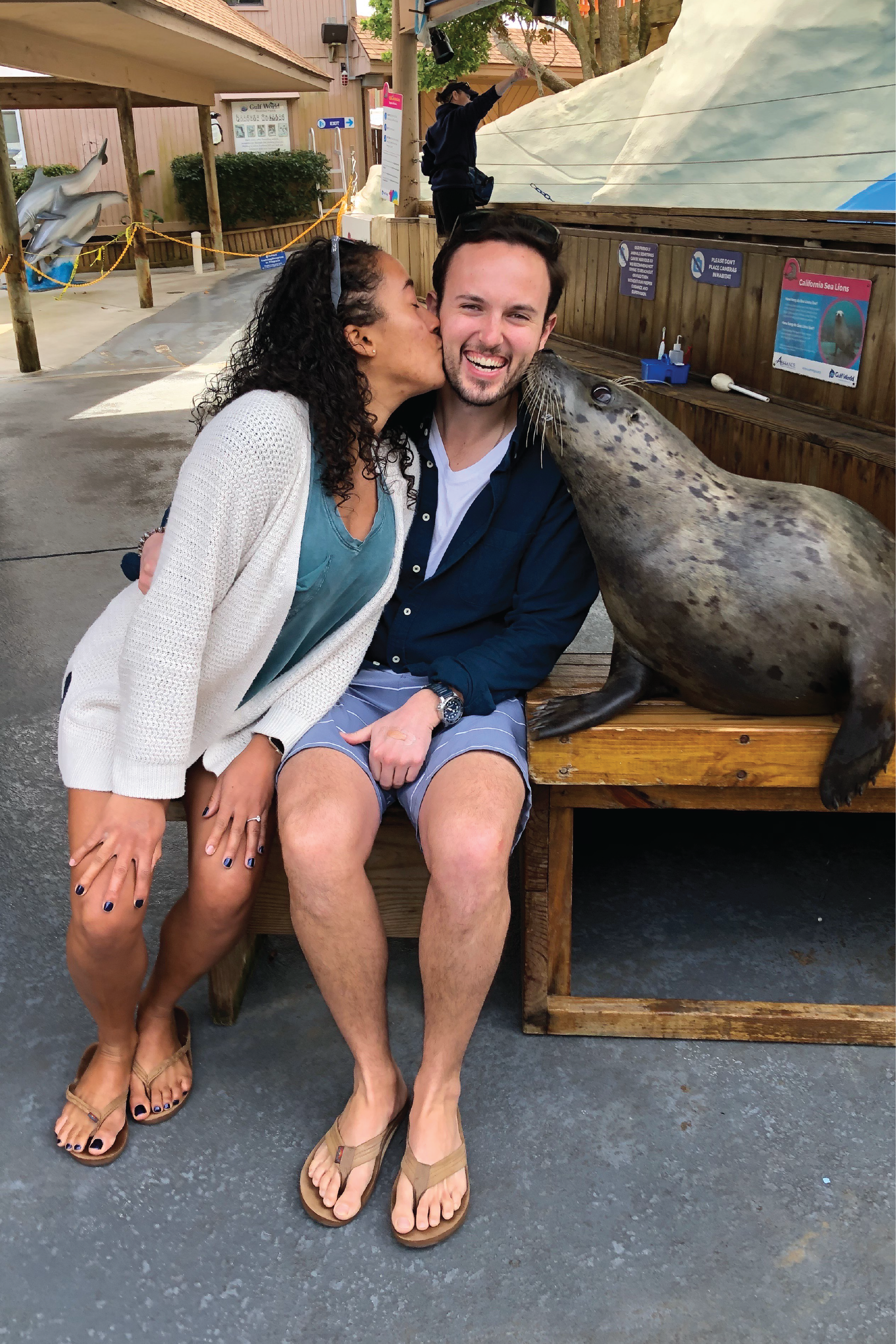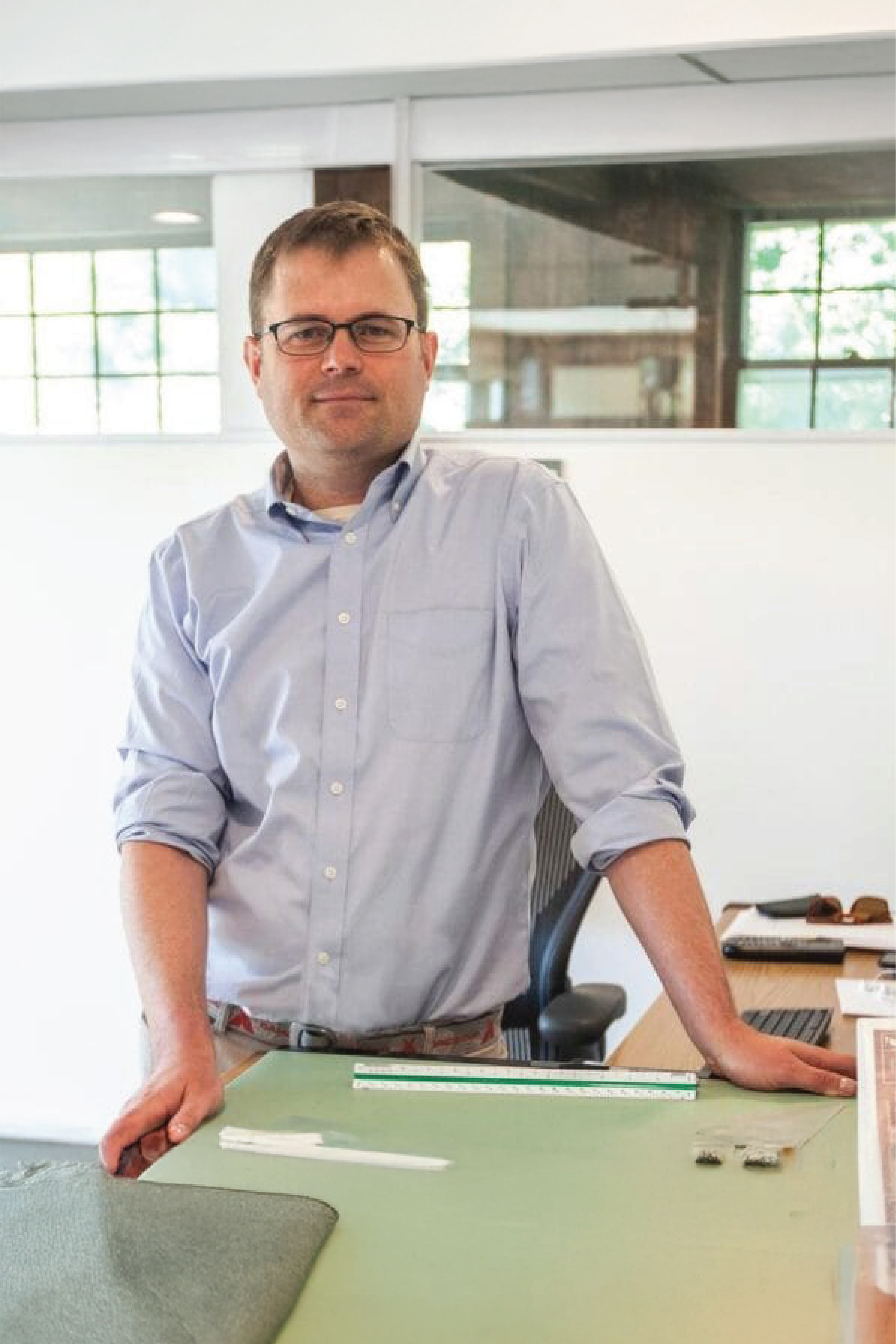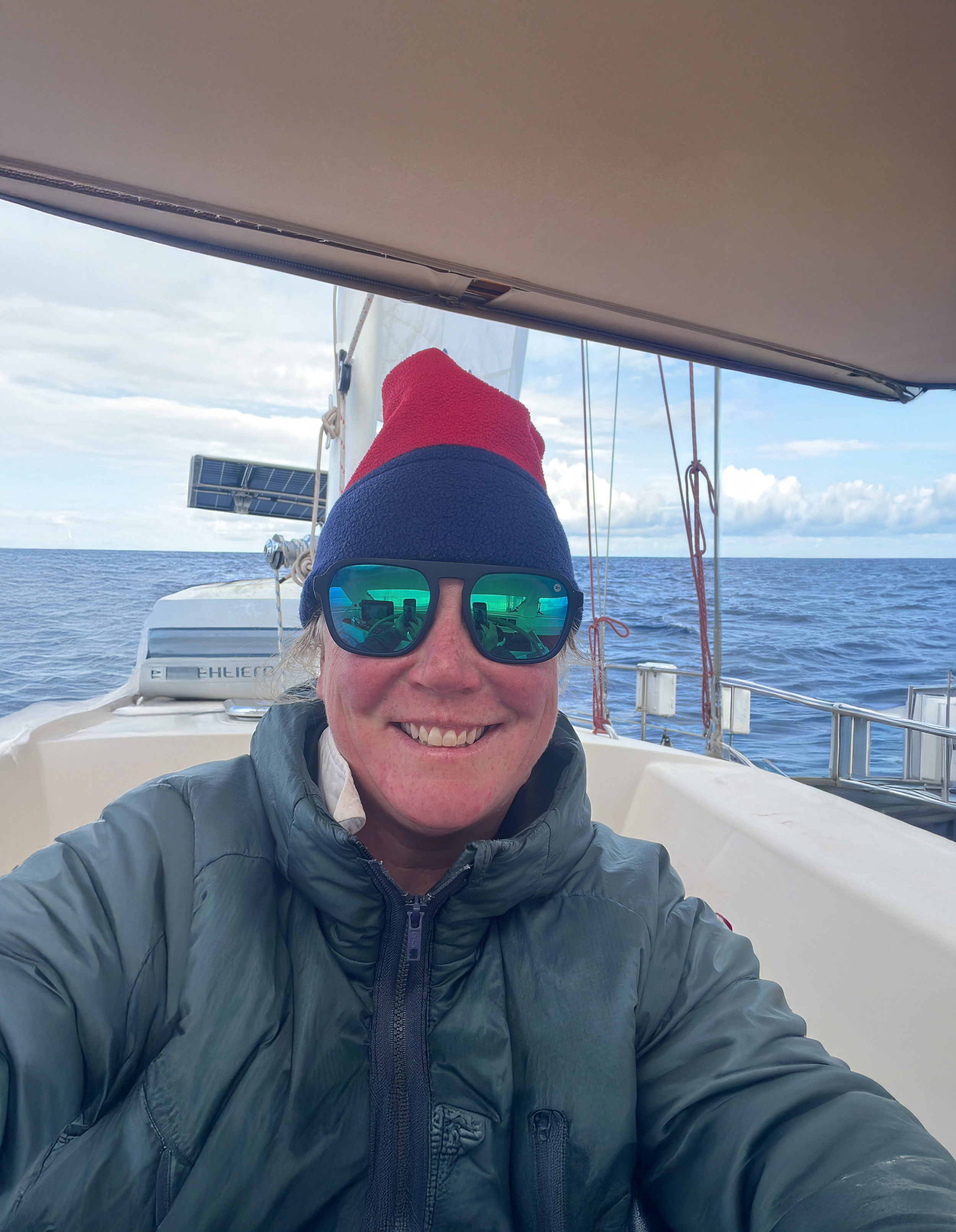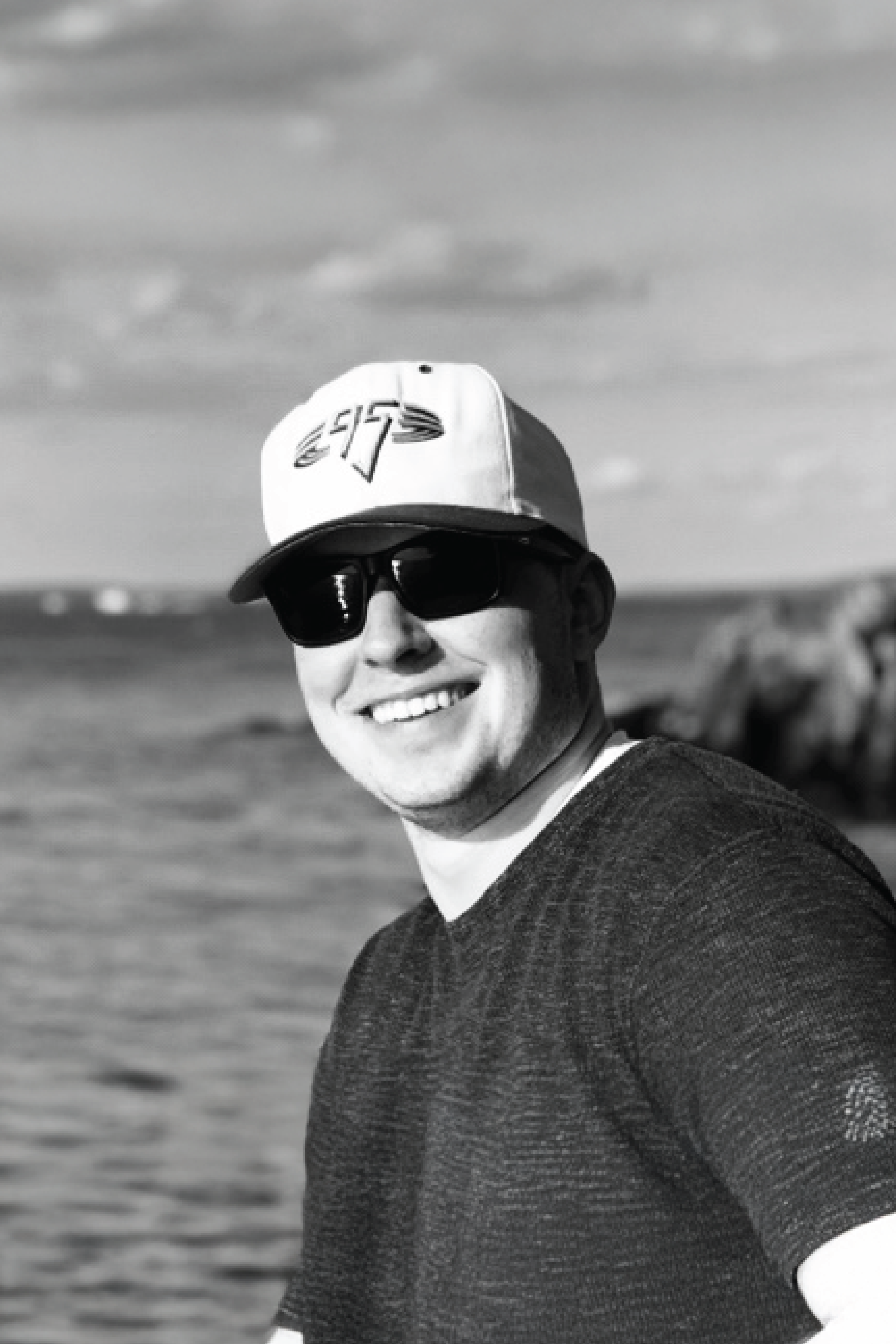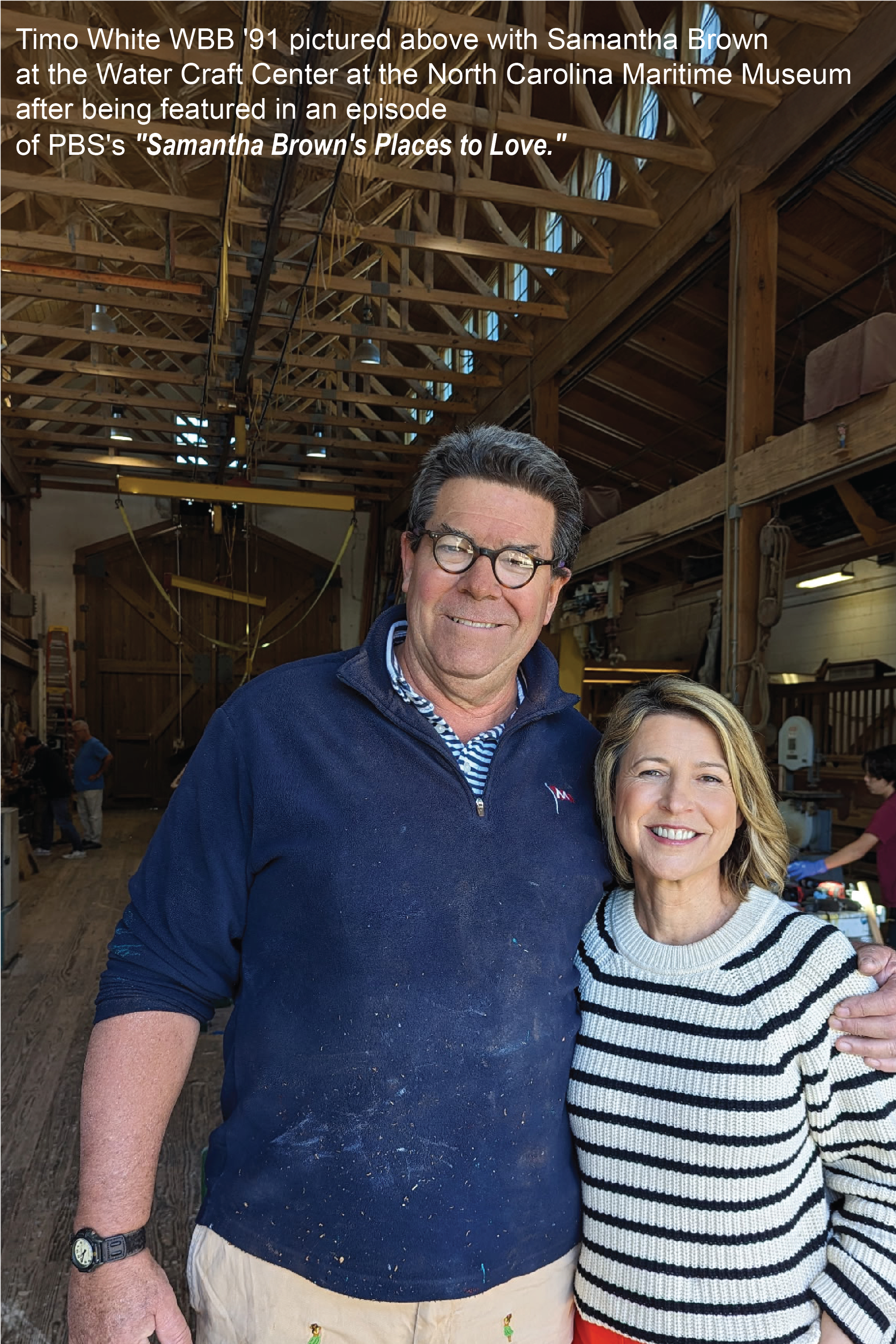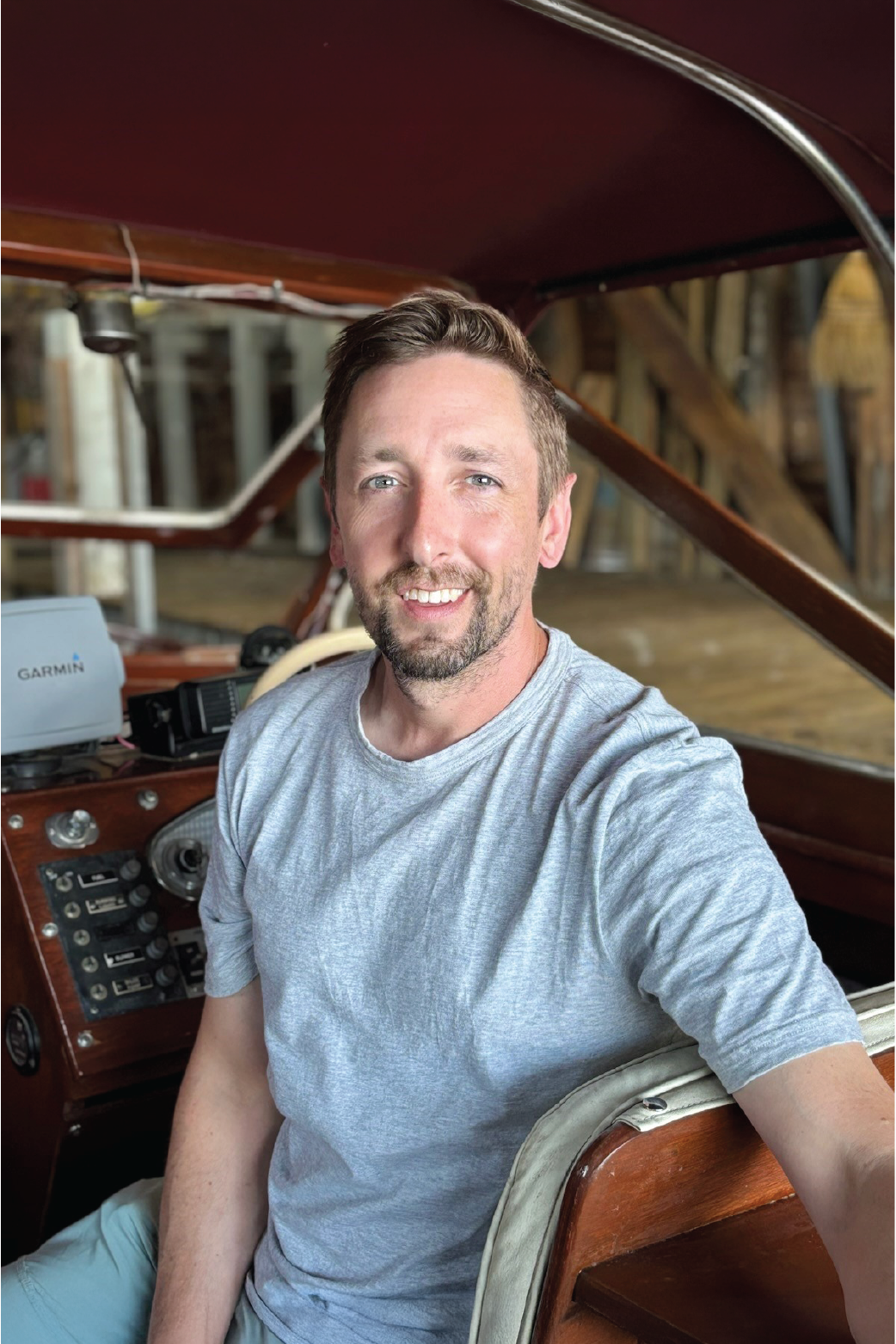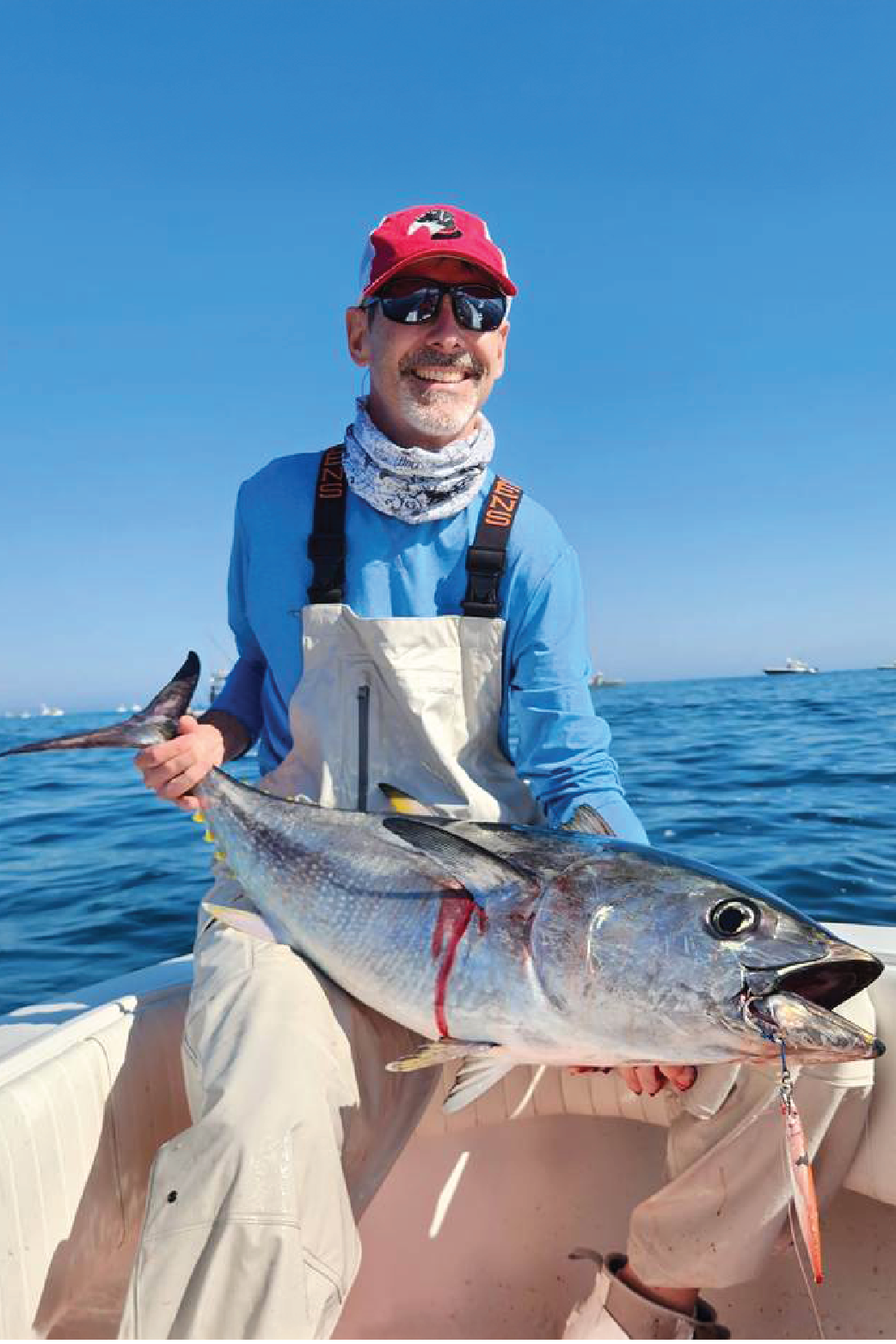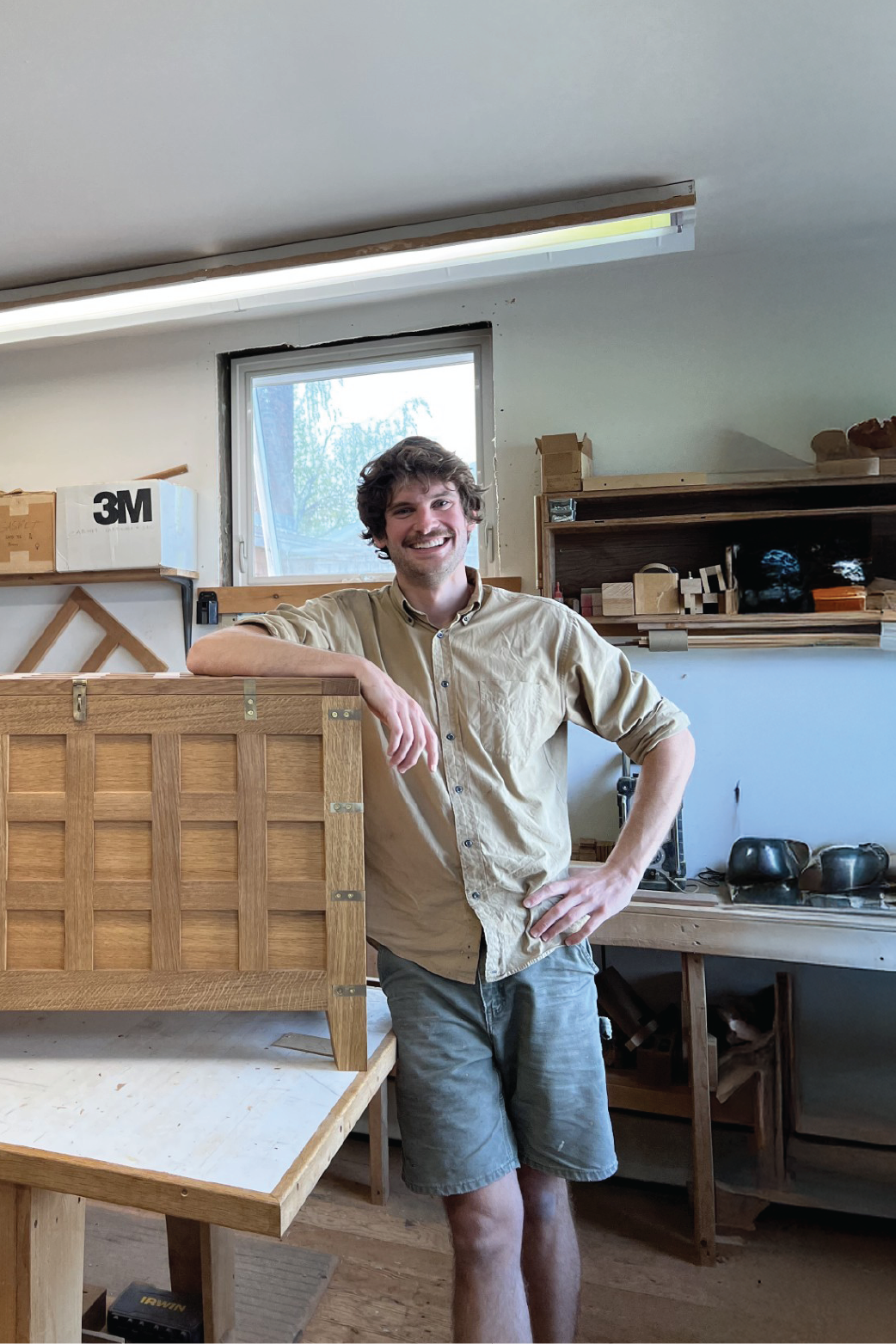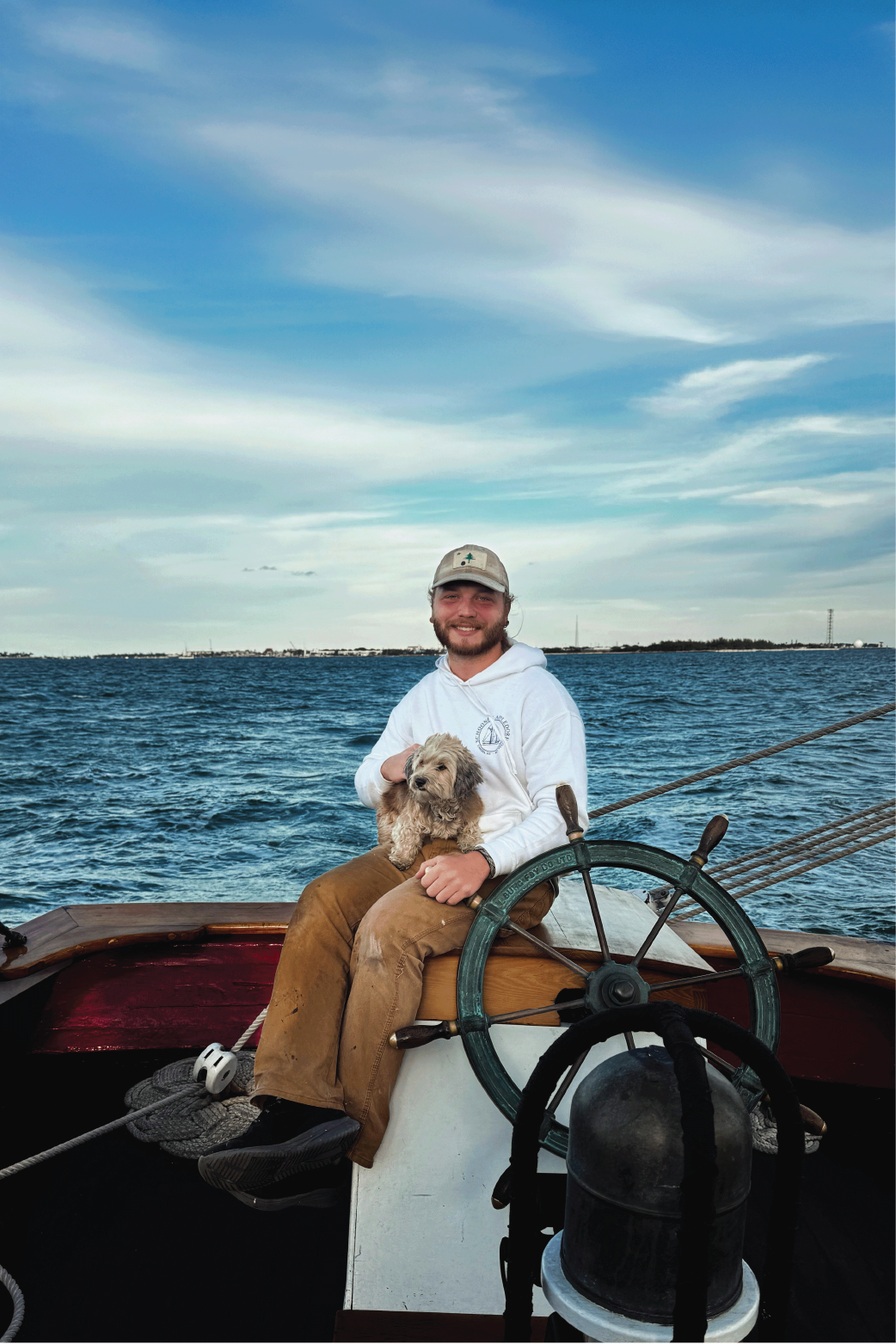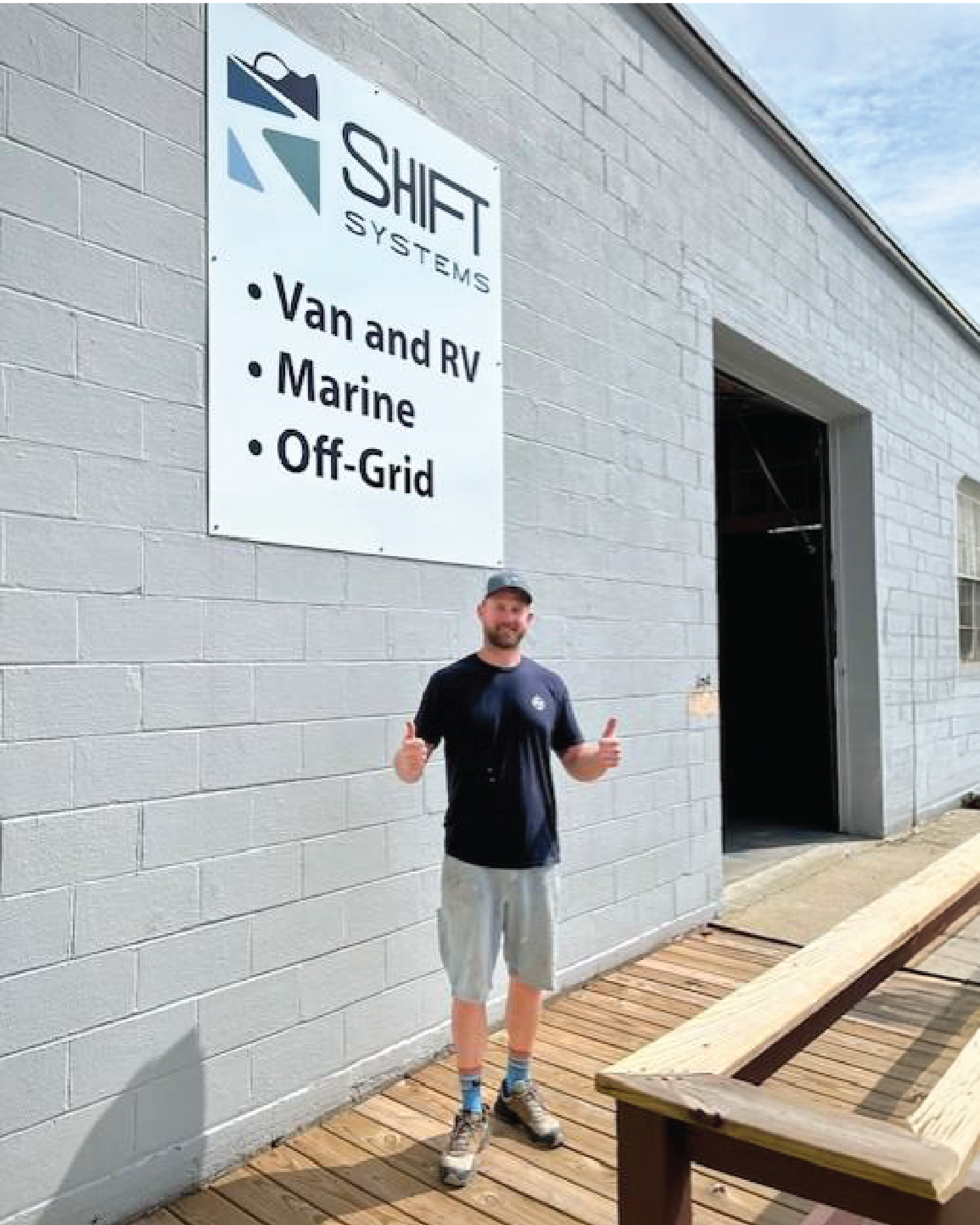Alumni Profiles
George Bittles
Marine Systems ’09
George Bittles has been through the Panama Canal five times. He's worked on yachts in Alaska, the South Pacific, the Mediterranean…anywhere the cruising crowd point their bows. For nearly a decade, he lived on other people's boats, "spinning wrenches" in engine rooms while the world swept past the portholes. It was exciting when he was in his twenties. In his thirties, he knew he didn't want to be a chief engineer at sixty, still sailing around on someone else's schedule.
The Landing School's Marine Systems program gave him the baseline in 2009. His uncle Scott had gone through the same program when it first started. After graduation, George packed up everything into the back of his truck and got hired on a yacht in a week and a half.
While working as an engineer, he'd keep his eye on brokers at boat shows. Many were guys who couldn't tell port from starboard, and they were making half-million-dollar commissions. It took three years to break into brokerage. But an owner he'd worked for made an introduction, and George learned a different part of the industry: the transactions, the drama, the whole ecosystem that floats up when a yacht changes hands.
Now he's a broker at Burgess Yachts, splitting time between Florida and New York. He's traded engine rooms for deal-making, and he can see himself doing this work for the long haul.
He has his own boat to tinker with now too, a rare1968 50' Huckins with a fully enclosed wheelhouse. Clearly, he's not quite ready to give up the labor of love entirely. He named it Solo because he's the only one who works on it. After years on other people's yachts, it's his. He cruises it around New York with his girlfriend and their dog, Haven. Solo, but not alone.
Julian Davis
Wooden Boatbuilding ’17
In eighth grade, Julian Davis stood before his entire school and declared with the certainty only a thirteen-year-old can muster that he would never work with boats for a career. He'd just finished building a dinghy with his neighbor, a boat builder and fisherman in rural Maine, and he’d had enough.
Years later, after a history degree in Ohio, Julian moved to Boston. One day, as he wrestled a trash bag to the dumpster at his shiny magazine job, his aunt happened to spot him mid-chore and asked how things were going. He gestured at the bag. Instead of assuring Julian he would someday move high enough up the ladder to abandon trash duties, she offered some perspective. His uncle, the co-owner of renowned Arey’s Pond Boat Yard with her, still took out the trash every day. Julian got the message.
Julian moved to The Cape and discovered that the work he had sworn off at the ripe age of thirteen might have a little more to it. By 2017, he was ready to fully commit. While in Wooden Boat Building he took advantage of the extra curricular management and captain's courses on offer, and was surprised to find himself in his element. He liked the organizational side of things, learning the systems and structure of what makes a boat shop run.
When he rejoined Arey's Pond the first thing he did was digitize everything. Timecards that had been filled out on paper for decades now lived in the cloud. It wasn't about abandoning tradition—it was about protecting it.
These days, Julian runs operations for Arey's, balancing innovation with reverence in an industry where both are essential. He mentors younger people entering the trade, helping them navigate everything from Roth IRAs to grain patterns, and works to keep small, family-run boatyards like Arey's Pond viable for the next generation. The boy who swore off boats learned what his aunt already knew: the best work comes from staying open to what you might become, not sticking to what you think you should be.
Sam Chamberlin
Yacht Design ’99
Launch day is when the guessing ends. The water answers every question a designer asks on paper—sometimes kindly, sometimes not. Sam Chamberlin designs boats knowing that his work will be judged not by committee or critique, but by physics and salt, in public, with the whole harbor watching.
He knew what he wanted young. While most Landing School students in 1999 were mid-career, Chamberlin arrived straight from high school, a gap year before studying physics at Bates. The liberal arts training taught him to think critically, to hear what clients aren't saying when they describe the boat they want and to know when a century-old building method beats the latest CAD solution.
Chamberlin was raised in Maine and spent summers on Penobscot Bay. Boats were his daily transport before he made them his profession. An epoxy allergy pushed him from building to design earlier than planned, but the shop floor remains close. His designs don't just look good on paper—they're built by the people working ten feet from his desk.
Sam eddies between projects: three years managing the massive 95 foot superyacht Ouzel, a 50-foot power boat of his own design, and soon a 1940s sailboat restoration. The diversity feeds him. Each project presents similar but new challenges—the designer's constant work of making the next one better.
For Sam, every boat begins as lines on paper and ends in the marina he can walk to from home, witnessing the moment when his idea becomes something that carries people across the sea.
Alicia Witham
Wooden Boatbuilding ’03
This past summer marked the first time in decades that Alicia Witham did not have a boat of her own, and it is surely the last. Because when you have an ocean‑loving wife, a dog with sea‑legs, and endless Maine coast inlets to explore, there isn’t really a choice.
In 2002, Alicia came to The Landing School planning on a career as a boat builder. She left with the technical skill of a boatwright, as well as the knowledge that she would apply her skills elsewhere. The Landing School was an exercise in patience and skill. It was a lesson in how humans show up differently, and how leadership means meeting them where they are. What she gained was something more durable than a trade: confidence in her own interests and abilities to take any problem down to its bones and rebuild it for the better. She learned that boats were not mysteries but puzzles, and that most problems, if approached from the right angle, could be solved.
That insight has carried her from heading up Outward Bound programs to running the largest sailing school in the country. Later, as Chief of Operations at the Northwest Maritime Center, she commuted in her Boston Whaler because it was faster than driving. She skimmed across the water every morning, her pup tucked by the console, both of them salt‑sprayed and thankful for a sea‑going commute.
Alicia has spent her career in leadership, always near the water, usually with a dog by her side. Her most recent project is as Executive Director of Maine’s First Ship, where she works on the familiar challenges of boatbuilding, albeit from a different angle: how the craft, history, and impact of the past can inspire the future.
But Alicia has always been an entrepreneur at heart, and she knows now that longevity in leadership requires feeding her own creative hunger. She is always planning her next projects—boats or otherwise—while steering Maine’s First Ship in a direction all her own. She is sure her future boat is waiting. So are the ideas. Both will get her steady hand, and both will carry her somewhere new.
Trevor McNaney
Yacht Design ’17
Trevor came to The Landing School in 2016 after deciding he did not want to spend his life at sea. He was interested in the skills of yacht design, not the destination. For his final project, he designed a boat for his father. While his classmates rendered sleek party yachts with polished lines and luxury finishes, Trevor drew up a chunky steel tug trawler. It looked like Thomas the Tank Engine. Utilitarian, industrial, built for work rather than aesthetic admiration.
Though Trevor knew he would not become a yacht designer, he understood that learning to see the world through a designer's eyes would serve him well. The coursework gave him pattern recognition. The math, the engineering, the endless calculations taught him to see correlations in data, to strip systems down to what was essential. Yacht designers know how to draw connections between numbers that others miss.
After graduation, Trevor worked at a shipyard designing piping systems for the Navy. In his spare time he was learning marketing and building a consulting practice one cold call at a time. Eventually cold calls became clients, and ad campaigns became real revenue.
Now, as Chief Marketing Officer at ErectorBot, Trevor manages marketing and development for a company that makes large-format 3D printers. The machines assemble with hand wrenches and use standard materials. The philosophy is simple: lower the barrier, strip away the excess, make the tool accessible. Through a new partnership, the work is circling back to boats. They are experimenting with printing hulls in high-density polyethylene, working toward seaworthiness standards, solving problems about stress points and material integrity.
Trevor is scaling up now, transforming the work of his agency into something larger, focused on integrating additive design across marine and construction industries. There is talk of land conservation and emerging technology, of systems that could change how things are built. His utilitarian, modest trawler design was the point all along. Making something usable and accessible is far more difficult than making it beautiful. Trevor learned that early. He has been building toward it ever since.
Jared Horn
Yacht Design ’16
Wooden Boatbuilding ’15
The morning we spoke, Jared Horn drove through early-season snow to Sierra Boat Company, where Lake Tahoe was still quiet. He wanted a few minutes to gather his thoughts amidst the new construction of his office and boats. Most mornings, he tries to have this time to himself. Alone in the shop, he studies the boats before the rest of the crew arrives, enjoying a silent communion with wood and water that has shaped his life since seventh grade.
It wasn't poetic mornings contemplating the unvoiced needs of a classic boat that set Jared on his path. Instead, he was inspired by a single, silly scene in Tommy Boy. At 13, he bought his own 14-foot sailboat, figuring if Tommy could do it, so could he. Jared taught himself to sail on Lake Dillon, Colorado's 9,017-foot high mountain waters, a landlocked kid with nowhere to go but up.
Close to graduating high school and not sure what came next, a chance encounter with a boatyard owner put The Landing School on Jared’s radar; he knew it was time to pack up life in the Southwest and head to Maine.
Now, as refinish manager at Sierra Boat Company, Jared is trusted with restorations no one has attempted before. He spends his days guiding the crew while managing the details that keep a classic boat shop alive. On any given day he can be found sourcing wood that honors a boat's history while respecting sustainable forestry, analyzing grain patterns via video calls, or jumping in to help varnish.
Approaching nine years at Sierra Boat Works, Jared's still called the new guy – though that hasn't stopped him from writing recommendations for coworkers to attend The Landing School.
Through his work on the water Jared knows himself well enough to understand that the hard things are what call to him, whether that's backcountry touring in Japan or the quiet morning study of a problem with no clear answer. The boy who taught himself to sail on a mountain lake learned early that the best destinations require you to find your own way there.
Jesse Brown
Small Boats ’02
Jesse Brown’s path to The Landing School began with his search for trade schools centered around woodworking. Initially interested in furniture and timber frame construction, he stumbled upon boat building and shifted gears, looking for wood boatbuilding schools. After exploring several programs, including IYRS, the Northwest School of Boatbuilding, and The Wooden Boat School, Jesse chose The Landing School for its accredited, 9-month program and its location on the East Coast. “I ultimately chose The Landing School because it was a 9-month course versus two years at IYRS,” he explains.
When asked what the most valuable skill or lesson he took away from the Landing School, Jesse easily said that “the woodworking skills with hand tools would be at the top of the list. Lofting and layout of curved complex shapes and being able to see and create “fair” lines would be a close second”.
One instructor, Paul Barton, who taught the Small Boats class, left a lasting impression. Jesse admired Barton’s calm and methodical approach to problem-solving, learning that patience and composure were often the best tools in the shop.
After graduating, Jesse returned to Michigan, working various jobs before briefly moving to Pittsburgh to work at a Woodcraft store. When a former classmate joined Van Dam Custom Boats back in Michigan, Jesse decided to apply, and has been there ever since. Starting as a boatbuilding apprentice in 2003, he gradually took on more responsibilities, eventually developing a full machine and fabrication shop that now produces 90% of the hardware used in Van Dam’s boats.
More than two decades later, the skills and mindset Jesse developed at The Landing School continue to shape his craftsmanship and guide his work at Van Dam Custom Boats.
Timo White
Wooden Boatbuilding ’91
Timo White came to The Landing School in 1990 after studying scenic design and working as a carpenter in New York City. He’d grown up sailing on the Jersey Shore—his father won Olympic gold in Sailing in Helsinki in 1952—and decided wooden boatbuilding offered more purpose than house carpentry. At TLS, White studied in the Small Boat program under Rick Barkhuff, Paul Barton, and Jamie Houtz. His class built an 18-foot Swampscott Dory and a Buzzards Bay 19, even convincing instructors to let them try Carvel planking. “Everybody was totally into what we were doing,” White recalls.
Olin Stephens, the speaker at Tim’s graduation, urged the class to open small shops rather than chase factory jobs. White followed that spirit, eventually finding a career in nonprofit shops where he could build and teach. Over the next three decades he led programs at the Philadelphia Maritime Museum, the Maritime Aquarium in Norwalk, and museums in New Jersey and North Carolina. Along the way, he encouraged promising young builders to follow his path to The Landing School, convinced by its mix of hands-on learning, career support, and lasting community.
That sense of community still surprises him. On a recent trip to Brittany, France, White stumbled upon a boat school run by another TLS graduate named Mike Newmeyer WBB ‘88—an American who had transplanted TLS’s model overseas. “As soon as I walked in, I knew he’d been to The Landing School,” White said.
White is enjoying retirement in Beaufort by opening what he calls a “WeWork-style boatshop,” where boaters can use his tools, tap into his expertise, and even learn to build their own craft. One of his first projects is partnering with a retiree from Virginia to build a 20-foot kit boat designed by fellow alumnus Clint Chase WBB ‘06— more proof of the strength of the TLS alumni network
Erik Lostrom
Yacht Design ’89
Wooden Boatbuilding ’88
Before he arrived in Arundel, Erik Lostrom had already maxed out every drafting class his high school offered and spent his senior year in an independent study with Westlawn in yacht design. Coming from a family of boatbuilders, the work felt familiar. He then considered naval architecture at Webb Institute—where a counselor, hearing his interests in pleasure craft under 200 feet and hands-on work, suggested The Landing School as a better fit.
Lostrom enrolled and completed two Landing School programs back-to-back, a demanding pace he still calls one of the most memorable stretches of his life. After graduating, he moved quickly into leadership on the service side also including boatbuilding, building and restoration of historic vessels. eventually serving as service manager for several yards in Maryland finally ending up at Haven Harbor Marinas on Maryland’s Eastern Shore, overseeing two yards and more than 20 technicians. There he led projects ranging from diesel engines, outboards, carpentry, electronics, rigging and composite repairs also work in early lithium battery conversions on long-range vessels—experience that taught him how costly mistakes can be and how vital customer education is to quality outcomes. He also launched winter seminar series for owners that routinely turned customer education into booked work and better relationships for owner-marina relations.
Today, Lostrom coordinates and teaches Marine Service Technology at Chesapeake College, expanding course time for deeper labs and even “sabotaging” student training boards to sharpen real-life troubleshooting. He collaborates with Marine Trades association of Maryland on workforce development and industry short courses, and he writes technical articles for SpinSheet, PropTalk, and FishTalk. He’s also co-authoring a new edition of Hank Hinckley Jr.’s yacht care and maintenance book as primary author. And he still finds time to volunteer with the Eastport Yacht Club Foundation, which introduces local underrepresented youth to the Chesapeake Bay and pathways to marine careers.
As he puts it, “I can affect better outcomes for the marine industry at this end than at a marina—this way, it’s broader support for our industry.”
Tucker Mitchell
Wooden Boatbuilding ’22
Tucker grew up in central Maine, just outside Augusta, and had always known about the Landing School. “It seemed like an out-of-the-box sort of place,” he recalls. At the time, boats weren’t yet a passion. That changed in his mid-20s, when he discovered sailing. Over the next decade, he logged miles across the Pacific, the Caribbean, and up and down the East Coast. “I got to a place where I was looking to kind of solidify some more formal education,” he says.
In 2021, Tucker enrolled in the Wooden Boatbuilding program, graduating in 2022. He came in with some systems knowledge from his time on boats but wanted to expand his skills. “For me, it was learning how to approach projects,” he says. “I didn’t grow up with a lot of technical knowledge, so it was a good way to plan, to take on bigger projects. And the carpentry side was huge - I knew nothing about carpentry before I started, and now I’m relatively proficient.”
He credits instructors Jake Greiner and Jake Jacobson with making a strong impression, especially Greiner, a Landing School alum. “It struck me how skilled and passionate he was about boatbuilding. You could tell that’s what lit a fire in him.”
After graduating, Tucker spent two years at Maine Yacht Center in Portland, gaining hands-on experience in carpentry, rigging, and large-scale projects. Recently, he launched Salty Coffee Sailing Expeditions, his own offshore charter business built around his Skye 51. He has refit the vessel himself, turning one cabin into a bunk room to carry four passengers at a time.
Starting this fall, Salty Coffee will offer immersive offshore passages, with trips from Bermuda to Antigua, throughout the Caribbean, and back north in the spring. “It’s for people who want offshore experience with an experienced captain,” Tucker explains. “The crew stands watches and gets involved in running the ship - it’s a huge learning experience.”
Though busy preparing for his first season, Tucker stays connected to the Landing School through social media and fellow alumni he’s worked alongside in Maine. “It’s pretty phenomenal how many grads are in the industry - often in leadership roles.”
Packer McBride
Wooden Boatbuilding ’21
For Packer McBride ’21, a career in boatbuilding began with a tip from a family friend. Pat Snyder, a boat builder and fishing guide on the St. Lawrence River, introduced Packer to The Landing School after his own son, Aziel, graduated from the program in 2010.
Drawn to a hands-on career with day-to-day variety and room for creativity, Packer enrolled at TLS and found more than just technical training. “Along with the experience and knowledge I gained, I was able to form lasting friendships that supported me in establishing my own shop, where I built and restored wooden boats,” he says.
Now, Packer is looking forward to the new school year from a different perspective — as someone who can mentor the next generation. “I’m most excited about the opportunity to work with new students and encourage them to realize their goals,” he says.
When it comes to favorite boats, Packer doesn’t hesitate: the St. Lawrence skiff. “It’s the combination of form and function,” he explains. “Beautiful to look at, while delightful for rowing and fishing.”
Greg Henry
Yacht Design ’96
Greg Henry first discovered the Landing School in 1994 through an ad in WoodenBoat magazine. Drawn to the opportunity to gain a thorough understanding of boat construction, he enrolled and immersed himself in both traditional wood and composite methods.
One instructor in particular, design instructor Walter Wales, left a lasting impression. “He was quite demanding and taught that all the details matter,” Greg recalls.
After graduating in 1996, Greg began working at Derecktor Shipyards in Mamaroneck, NY. Over the next three and a half years, he gained experience in various departments, focusing on project engineering and the fit-out of large yachts and high-speed ferries. He later became the yard’s primary electrical engineer.
In 1999, Greg left the shipyard to complete a three-year double-handed circumnavigation with his wife. Returning in 2003, he rejoined Derecktor at their Bridgeport, CT facility as the yard’s electrical engineer. After completing a major project for the State of Alaska ferry system, Greg transitioned into commercial shipping, joining Voigt Maritime Inc. in 2005.
The move marked a shift from shipyard construction to managing a weekly cargo liner service to Bermuda. Today, Greg serves as President of Voigt Maritime.
Greg remains connected to the Landing School through annual donations and by keeping up with its news via mail and email updates.
William Delano
Yacht Design ’21
William Delano’s connection to the Landing School began in high school, at a marine trades symposium in Annapolis, Maryland. “There was a Landing School representative, and I think that’s the first time I talked to someone from the Landing School,” he recalls. Originally from D.C., he credits that moment as the most impactful introduction to the school.
He didn’t attend right away. After high school, he enrolled at IYRS for their boatbuilding and restoration program, then worked as an apprentice in the shipyard at the Chesapeake Bay Maritime Museum. When COVID hit, his path shifted. “The program wasn’t really fulfilling my needs anymore,” he says. “I felt motivated to do something else.” With a growing interest in yacht design, he enrolled in the Landing School’s design program in the fall of 2020.
It was a unique year, shaped by the pandemic and a smaller-than-usual class. “Anyone who was there had really felt strongly about being there and making this change in their life,” he says. Though he had already been building boats, he came to the Landing School to learn design. “Everyone was so passionate… If they weren’t doing it for work, they’d probably be doing it for pleasure.”
After graduating, he moved north to Belfast to work at French & Webb, a company with strong Landing School ties. While the original project he signed on for didn’t pan out, he stayed on and ended up working on a range of jobs - from carpentry to design work, including superyacht furniture and a boutique hotel in New York City.
He still keeps in touch with a few classmates and instructors and says, “I should be more connected, because I really do appreciate the Landing School.”
Joshua Koch
Marine Systems ’24
Joshua Koch’s path to the Landing School started with a recommendation from a friend in the tall ship industry. “Nick Patey was a buddy of mine,” he says. “I mentioned I wanted to get kind of a formal education, and he recommended the Landing School because he was an alumni. He took me on a tour — and that was it.”
Originally from Michigan and spending winters in the Florida Keys, Josh moved to an apartment on Old Orchard Beach and made the 40-minute commute to campus each day. As the second-youngest student in his marine systems class, he found himself surrounded by older classmates from a range of backgrounds. “I was kind of an odd duck,” he says. “I’d already spent a lot of time in the industry before going to school, which was kind of backwards.”
Josh credits his instructors — especially Pete Worthington — with shaping his approach to systems work. “Pete had this thing where he’d say, ‘Start stupid early,’” Josh recalls. “If an engine isn’t starting, don’t jump into the complex stuff. Start simple. That stuck with me.”
What the Landing School gave him most, though, was confidence. “Ripping an engine out of a boat and putting it back in sounds simple enough,” he says, “but I gained a lot of confidence by actually doing it, and having the chance to mess up and learn.”
Even before graduation, Josh landed a job as the engineer on a Tall Ship in Washington. Currently managing a portion of a company in Boothbay, Maine, Josh also serves as an engineer and the traditional rigging consultant.
Though he’s currently connected to the school mainly through social media and the occasional update from Nick, he says, “There’s a part of me that would like to be more involved… maybe come back as a systems instructor someday.”
Mike Akeroyd
Associates Degree ’11
Mike Akeroyd’s journey to starting his own marine systems business began far from Maine’s boat shops; in San Diego, where he found himself looking for a career change. “I just went online and found the school,” he recalls. “I gave them a call, and they said they had one spot left in the composites program. I said, ‘I’ll take it.’”
Four days later, Mike had packed up his car, loaded in his dog, and was driving across the country.
What stuck with Mike most wasn’t just the technical training — it was the people. “I’d say the most valuable thing I got from the school was meeting the people there,” he says. “Now that I’m out in the world… I know I have a whole bunch of people I can call.”
One of his strongest influences at the school was his systems instructor, Roger Hellyar-Brook. “He had this motto: ‘Keep them boating,’” Mike says. “His point was, if someone’s boat keeps breaking down during the short season, they’ll eventually end up selling them. Your job is to make sure you keep them boating.”
After graduating, Mike was hired by Great Island Boatyard in Harpswell. “They hired me because I went to the Landing School,” he says, specifically crediting his ABYC certifications. He worked there for nine years before starting his own shop, Shift Systems, in Portland. “I don’t think I would have that without the Landing School,” he says.


